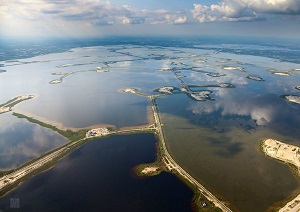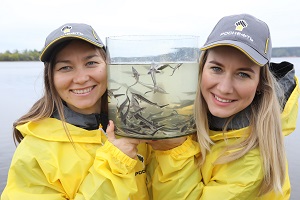Rosneft Improves Water Management

On March 22, the world celebrates Water Day, which was established by the United Nations General Assembly in 1993 to draw attention to the importance of sustainable water consumption.
Careful and sensible use of water resources is Rosneft’s priority in environmental protection. In 2022, the Company continued implementing measures for reducing water use and the volumes of intake from natural sources and managed to reach the 7% cut. The proportion of recycled and reused water in the Company’s operations has exceeded 90% over the past nine years.
Rosneft is working towards optimising the use of water resources to reduce the intake and consumption rate. At the Samotlor field, for example, an advanced technological system for maintaining reservoir pressure has eliminated the need to draw water from surface sources. This innovative method has so far helped to reduce water intake from natural bodies of water by more than 200,000 cubic metres per year.
Samaraneftegaz has completely stopped drawing water to maintain reservoir pressure and does not discharge any wastewater into water bodies. RN-Vankor has introduced an integrated system to reuse domestic water that has undergone filtration, as well as water produced along with oil, to maintain reservoir pressure. Over the years, the enterprise’s water consumption has remained flat despite the active development of the Vankor cluster.
The Company’s refineries are implementing projects to build and renovate wastewater treatment plants and biological wastewater treatment facilities. In 2022, Syzran Refinery started installing aeration system equipment with membrane bioreactor technology, which, in the long term, will ensure that the wastewater is treated thoroughly for both organic and mineral pollutants with 99% efficiency. Angarsk Petrochemical Company is building a state-of-the-art industrial wastewater pre-treatment plant. Novokuibyshevsk Refinery rebuilt and modernised its “makeup” water networks last year. Kuibyshev Refinery is also undergoing a reconstruction of its existing treatment facilities.
Advanced wastewater treatment systems at Rosneft facilities have already shown their effectiveness. Achinsk Refinery cleans more than 140 tonnes of pollutants from its wastewater each year, making the water cleaner than it was before it was taken in. The refinery ensures an effluent treatment efficiency of up to 99.8% at the existing treatment units and does not discharge wastewater into open bodies of water for 10 months a year.
In 2022, Komsomolsk Refinery completed the first phase of a project unique to the Far East—to construct a closed collector of the Klyukvenny Stream, which flows through the refinery’s territory. Almost 2 km of the stream bed has been “encased” in reinforced concrete blocks with monolithic sections in the bends and waterproofed along its entire length. The project is not limited to the refinery area: on Gorodskaya Street, which was washed away by the stream during the high-water period, a new bridge has been built the open bed has been reinforced.
The Company’s enterprises undertake projects to restore natural resources, protect ecosystems and biodiversity. With the support of Vostsibneftegaz, scientists from the Tomsk State University have evaluated microplastics content in the headwaters and estuary of the Nizhnyaya Tunguska and Yenisei rivers. Samotlorneftegaz used multispectral space imaging to make an inventory of all types of water bodies located in its licence areas and extensively surveyed over 100 lakes to further clean up and restore their biodiversity.
Every year, employees of Rosneft’s enterprises hold dozens of volunteer events to clean up shorelines, supporting such environmental projects as Green Spring, Clean Shores, Clean Forest, Water of Russia, Clean Shores for Volga, We Clean the World, Samara Springs, and others. In 2022, the Company’s employees cleaned more than twenty water bodies: rivers, lakes, reservoirs, seashores, etc. A total of over 147 hectares was cleaned by the oil company’s volunteers.
Moreover, Rosneft organises activities to conserve and restore aquatic biological resources. In 2022, the Company’s enterprises released more than 55 million fish fry in the waters of the Volga, Ob, Yenisei, Ural and Onega rivers. These include valuable and red-listed species such as sterlet, carp, peled, sturgeon, bighead carp and kuman.
 With the support of RN-Purneftegaz, the Purovsky district of Yamal-Nenets Autonomous District is implementing a project to breed valuable fish species. In July, the Kharampur Municipal Agricultural Community released rainbow trout fry into a breeding line, which the oil workers helped to acquire. The agriculturalists plan to grow up to ten tonnes of fish in two years. Through trout breeding, the community’s members have gained unique experience, which will help them breed fry of valuable whitefish species (muksun, nelma, broad whitefish) to replenish their population in the rivers and lakes of Yamal.
With the support of RN-Purneftegaz, the Purovsky district of Yamal-Nenets Autonomous District is implementing a project to breed valuable fish species. In July, the Kharampur Municipal Agricultural Community released rainbow trout fry into a breeding line, which the oil workers helped to acquire. The agriculturalists plan to grow up to ten tonnes of fish in two years. Through trout breeding, the community’s members have gained unique experience, which will help them breed fry of valuable whitefish species (muksun, nelma, broad whitefish) to replenish their population in the rivers and lakes of Yamal.
* “Makeup” water is fresh water taken from the surface and underground water bodies, including supplied by the third parties under the agreements of water supplies. It is used for production, practical and other needs of the Company.
Rosneft
Information Division
March 22, 2023